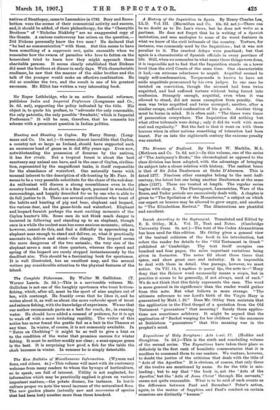A History of the Inquisition in Spain. By Henry Charles
Lea, LL.D. Vol. III. (Macmillan and Co. 10s. 6d. net.)—There can be no doubt as to Dr. Lea's views, but he does not write as a partisan. He does not forget that he is writing of a Spanish institution, and sees analogies to some of its worst features in what we know of the civil tribunals of the country. Torture, for instance, was commonly used by the Inquisitors; but it was not peculiar to it. The cruelest delays were practised ; but that again is a characteristic of Spanish officials in every province of life. Still, when we remember in what name these things were done, it is impossible not to feel that the Inquisition stands on a lower level than the civil Courts of the same time. One characteristic it had,—an extreme reluctance to acquit. Acquittal seemed to imply self-condemnation. Torquemada is known to have set aside acquittals pronounced by his own judges. In one case he insisted on conviction, though the accused had been twice acquitted, and had suffered torture without being forced into confession. Strangely enough, acquittal, even when it was allowed to stand, did not mean exemption from penalty. One man was twice acquitted and twice scourged; another, after a similar escape, suffered confiscation of his goods. Another thing must be borne in mind. It is often said : "The times were times of persecution everywhere. The Inquisition did nothing but what other tribunals were doing ; only it did its work with more zeal and regularity." But the fact is that it went on with these horrors when in other nations something of toleration had been learnt. Far on into the eighteenth century the extreme penalty was exacted.










































 Previous page
Previous page